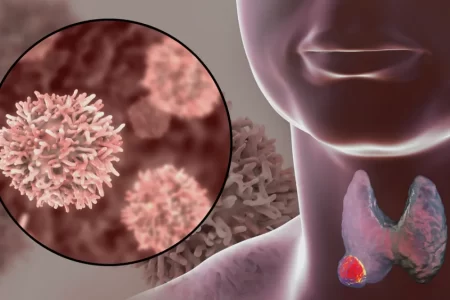What is a Radioactive Iodine (RAI) Treatment?
Radioiodine therapy is a nuclear treatment for an overactive thyroid, a condition called hyperthyroidism. It is also used for the treatment of thyroid cancer. Radioactive iodine is an isotope of iodine that emits radiation and is used for medical purposes. A very small dose of radioactive iodine I-131 is swallowed. It gets absorbed into the bloodstream and concentrated by the thyroid gland, where it begins destroying the gland’s cells. The thyroid gland produces two hormones that regulate all aspects of the body’s metabolism, the chemical process of converting food into energy. When a thyroid gland is overactive, it produces too much of these hormones, accelerating the metabolism.
How Does Radioactive Iodine Treatment Work for Thyroid Cancer?
The radioactive iodine from the drink or capsule is absorbed into the body and picked up by the thyroid cancer cells, even if they have spread to other parts of the body. The radiation then destroys the cancer cells. This is known as targeted radiotherapy because the treatment goes straight to the cancer and has very little effect on healthy cells in the body.
The therapy is given after the removal of the thyroid gland to destroy any remaining thyroid tissue. Test amounts of radioactive iodine can also be used to track patients who have some remaining thyroid tissue and cancer that could have spread to other parts of the body. These tests show if iodine concentrates in areas that contain thyroid cancer and whether large amounts of RAI are needed to destroy the tumor implants.
Risks and Side Effects of Radioactive Iodine Treatment
Depending on the dose used in the treatment, a hospital stay in a special isolation room for a few days may be required to prevent others from being exposed to the radiation.
Short-Term Side Effects of RAI Treatment Include:
- Neck tenderness and swelling
- Nausea and vomiting
- Swelling and tenderness of the salivary glands
- Dry mouth
- Loss of taste or taste change
- Insufficient salivary production
Possible Long-Term Side Effects Include:
- Lower ability to have children
- Inflammation of the salivary glands
- Tiredness
- Dry eyes or watery eyes
- Lower levels of blood cells
- Lung problems
What Precautions Should be Taken With Radioactive Iodine Treatment?
- Women who are pregnant or nursing should not receive RAI therapy. Pregnancy needs to be delayed at least 6 to 12 months after the RAI treatment for thyroid cancer. Breastfeeding should be stopped at least 6 weeks before RAI and should not be resumed.
- Avoiding prolonged physical contact with others, especially with children and pregnant women.
- Avoiding public places.
- Avoiding sharing kitchen and cooking utensils, bedding, towels, and personal items with others.
- Washing hands often and taking shower daily.
- Sleeping alone and avoiding prolonged intimate contact for three to four days.
What Happens After Radioactive Iodine Treatment?
Follow-up after radioactive iodine treatment is essential. There is no single correct dose and most of the patients need a further dose. Some patients require treatment with anti-thyroid medication for some weeks or months until the radioactive iodine has been effective and the over-activity has settled.
Over two-thirds of those who have radioactive iodine treatment will develop hypothyroidism. This can occur anytime from one month after the treatment and is most common within the first 12 months. Blood test about four to six weeks after the treatment is required and should then be checked every one to three months in the first year.
Increased food intake without weight gain during the period of over-activity (increased metabolism) may be noted. Once the thyroid function and metabolism are normalized, food intake needs to be reduced to avoid excessive weight gain.
Radioactive Iodine Treatment for Children and Teenagers
Radioactive iodine therapy is effective and safe for children and teenagers with an overactive thyroid gland, but will usually be given as a second-line treatment after a reasonably long course of anti-thyroid medication. It is used less commonly in younger children.
Frequently Asked Questions (FAQs)
Does everyone with a diagnosis of thyroid cancer need treatment with radioactive iodine?
The recommendation to treat with radioactive iodine depends on the extent of surgery, size, number and type of tumor, pathology report.
Is radioactive iodine treatment safe for thyroid cancer?
The long term risks of developing second cancers after radioactive iodine are extremely small.
What are the possible side effects of RAI?
Metallic taste, Nausea, Swollen salivary glands are the possible side effects.
What are the safety precautions to be taken with radiation after treatment with I-131 RAI?
RAI produces radiation so patients must avoid radiation exposure to others, particularly to pregnant women and young children.
How to reduce radiation exposure to others?
Radiation exposure to other people can be reduced by keeping a reasonable distance between the patient and others.
What are the long term risks of I-131 RAI?
Hypothyroidism is a common side effect of RAI for hyperthyroidism and can always be seen after RAI for thyroid cancer.






